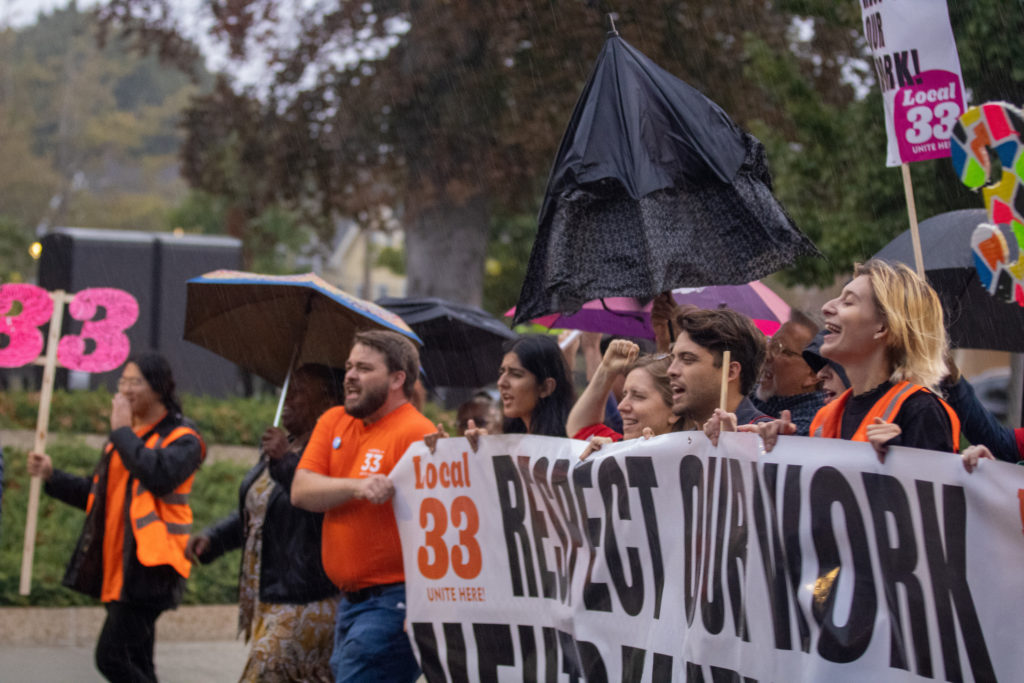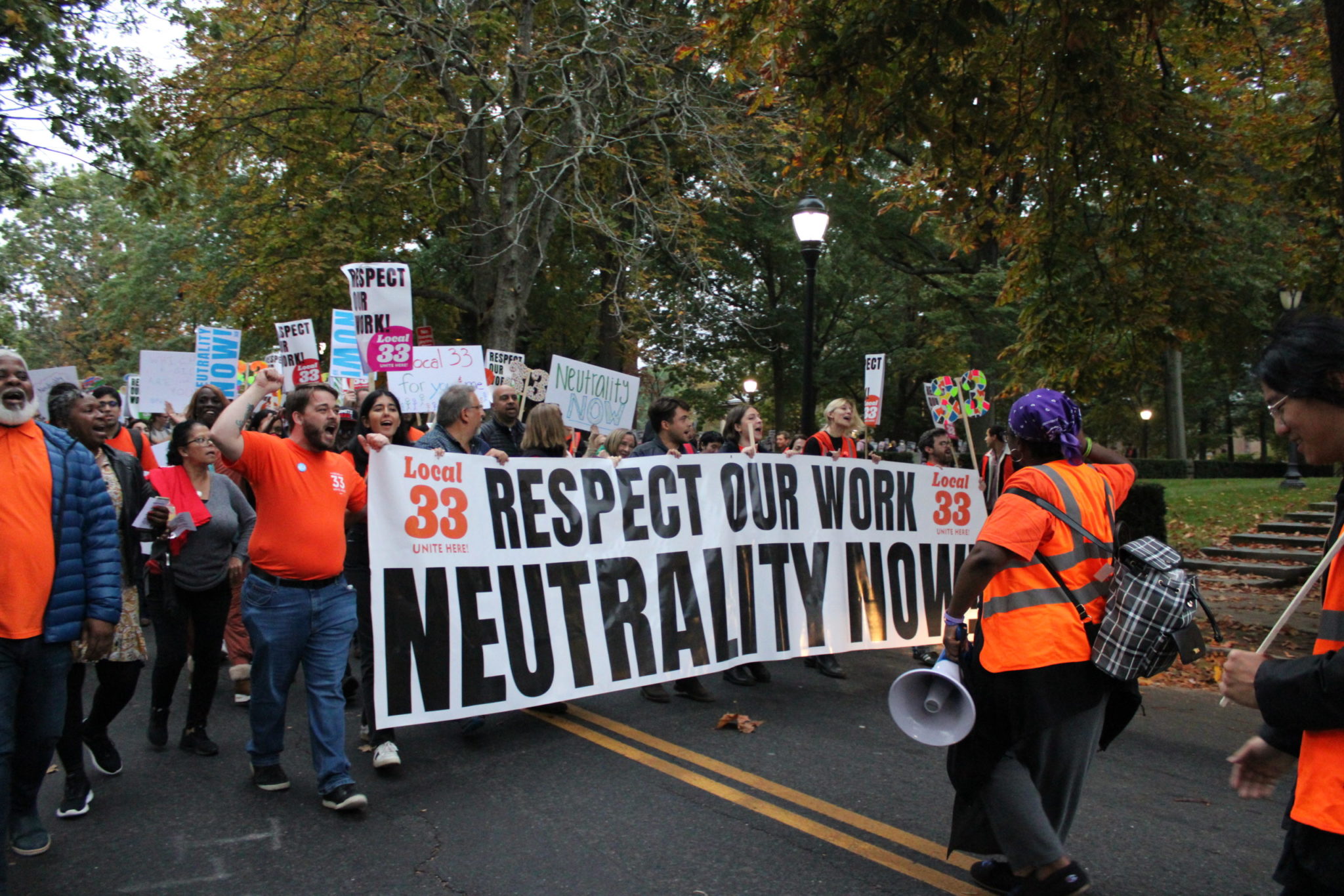
Abraham Payne, Contributing Photographer
Graduate student workers are renewing calls for Yale to remain neutral in their unionization efforts.
Over a thousand people withstood pouring rain at a Thursday rally to support graduate students in their longtime fight for a contract with better working conditions and pay, as well as recognition as University employees. Speakers celebrated the importance of unions at Yale and the work of Local 33, Yale’s unrecognized graduate student union.
“University leaders should not use their positions of power to interfere in our efforts to form a union,” Chris Camp GRD ’27 said. “I came to graduate school — like many of you — to research and teach what I love … I want to be able to focus on these responsibilities not on my dental care, paying rent or finding a therapist.”
So far, the University has announced no official stance on the union and has repeatedly said it supports “free and robust debates.”
But protestors say that Yale’s previous hiring of a law firm with an anti-union reputation and recent messaging on Local 33’s weeks-long campaign process reveal a hostile position against the union question.
“Given Yale’s global prominence, the example it sets on the question of graduate worker unionization will have implications that extend far beyond the campus,” said rally organizer Abigail Fields GRD ’24. “In this moment, we hope that this example is one that not only supports but celebrates democracy and action.”
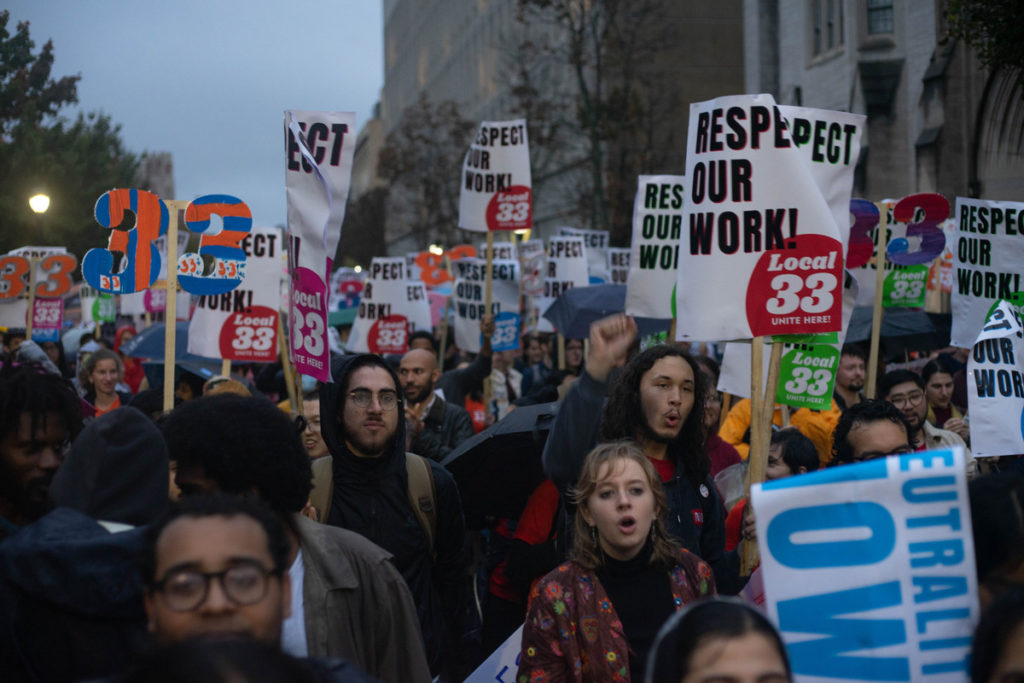
Local 33 has been collecting signed cards from graduate students in hopes of scheduling a vote to unionize with the National Labor Relations Board. Yale, they argue, should either voluntarily recognize the union or allow unionization to proceed without interference.
“Yale supports a free and robust debate over graduate student unionization among those who may be affected by it, including the graduate students who would make up its ranks as well as faculty and other students,” University spokesperson Karen Peart wrote to the News. “Yale also supports the rights of employees to form unions.”
Peart also referred the News to a frequently-asked questions webpage on the University’s stance on unionization.
That FAQ, sent by Dean of the Graduate School of Arts and Sciences Lynn Cooley in a Sept. 22 email to the GSAS student body, was interpreted by many graduate workers as anti-union. Beyond basic explainers on unions, authorization cards, NLRB elections and contract negotiations, the FAQ made several claims about the nature of a potential recognized union.
Local 33 organizers released an annotated version of the FAQ, raising concerns with Yale’s “misrepresentation” of the union.
The FAQ asserted that workers cannot revoke their pro-contract authorization card signatures once submitted — a claim Local 33 has said is untrue. Administrators also mentioned that a union would become the “exclusive bargaining agent” for workers, indicated that the union could compel all workers to pay dues with the threat of dismissal and insinuated that the GSAS student government would lose power.
Notably, the email also encouraged students to call University Public Safety if they felt pressured or coerced into casting ballots.
“To tell us to call Yale Security on our coworkers, on our fellow graduate students, can be really dangerous for some people and actually lead to some risky life and death situations, potentially,” Porras told the News. “The way I feel about it is that there is no real care about our well-being.”
The crowd on Thursday erupted into loud boos when organizers referred to Cooley’s email.
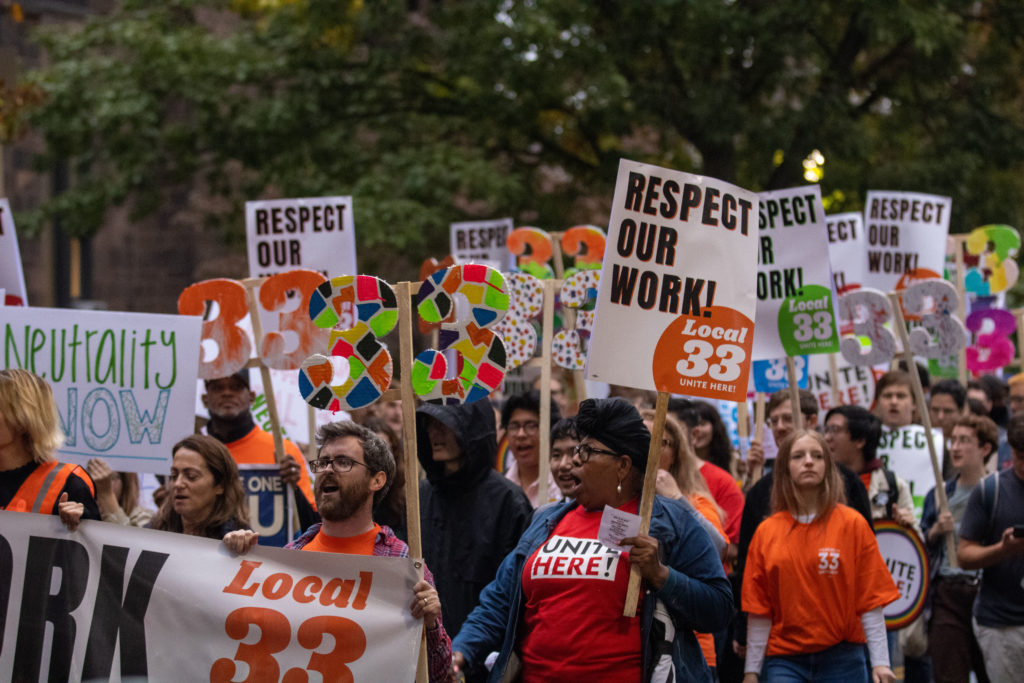
Local 33 organizers also pointed to Yale’s past work with the law firm Proskauer Rose. As an employer-side labor firm, Proskauer Rose has earned a reputation for pushing against unionization efforts at major employers like the New York Times and other universities, including Columbia and Duke. Among concerns with Yale’s “misrepresentation” of the union, Local 33 pointed toward its relationship with the firm in an annotated version of Cooley’s Sept. 22 email.
Local 33 argues that collective bargaining rights as a union would help alleviate a range of hardships faced by graduate students. Thursday’s protest drew new attention, for example, to the dangers faced by international graduate students as immigrant workers.
Lihao Yan GRD ’27, a graduate worker from China, told the crowd that many student workers must choose between their research posts and going back to their home countries.
Harvard’s graduate worker union helped their international students navigate immigration challenges and threats to safety, while MIT’s was able to ensure they received continuous pay and employment benefits to those unable to return to the U.S. Without a union, Yan said, Yale’s international graduate workers remain vulnerable.
“I did not return home for four months, fearing that my visa status could be affected if I left,” Yan said. “I was fearing that anything could happen to my family members who were thousands of miles away with no possibility of me going back to see them again. International students here live in constant fear and instability. And it is Yale’s job to provide us with the necessary protection and support we need.”
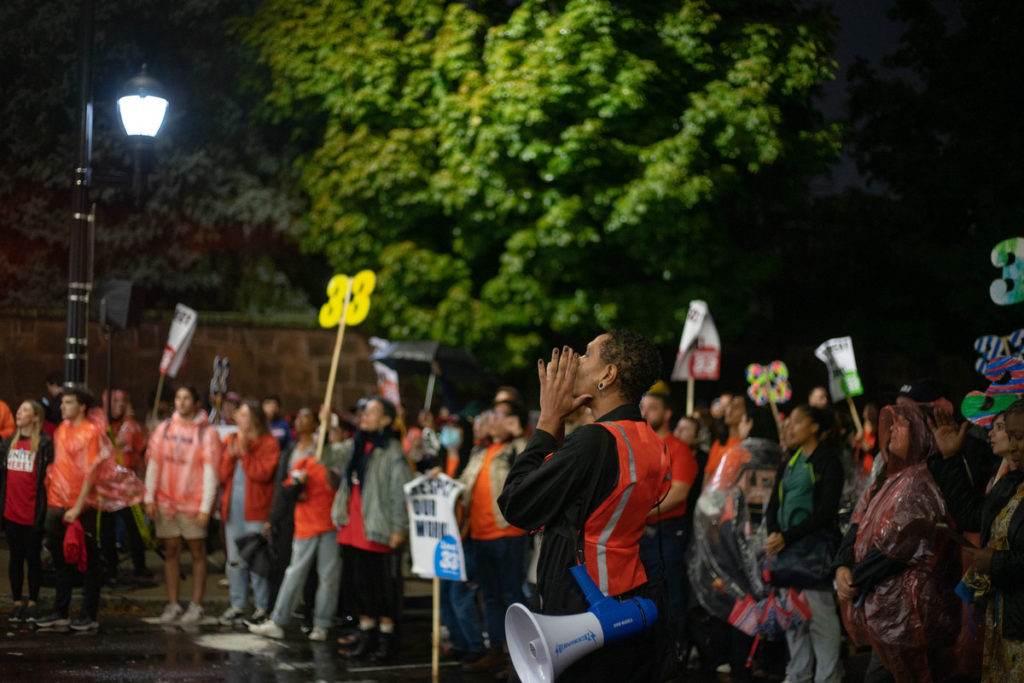
Sasha Tabachnikova GRD ’26 referred to difficult experiences with finding mental health care, sharing that it took eight months to get matched with a therapist. Camp, the Local 33 organizer, added that they joined Local 33 as soon as they arrived on campus, hoping to combat a culture of hazardous working conditions they faced in previous research positions, where they had no grievance procedure. Javier Porras Madero GRD ’26 said that, despite recent increases to graduate student stipends, workers have found it challenging to keep up with the high cost of living in New Haven.
“We don’t have much transparency from Yale on why they won’t commit to neutrality,” Arita Acharya GRD ’24 told the News. “They could do it right now. And Yale has their own honestly great history of labor peace with the other unions here on campus.”
Graduate students saw significant support from Local 34 and 35, which together represent the University’s service, maintenance, technical and clerical workers.
Despite Yale’s quick negotiations with Local 34 during the 1980s, they still previously held dismissive attitudes toward the technical and clerical workers’ union, according to Bob Proto, president of the service and maintenance workers’ union Local 35. During the April rally, longtime Local 35 steward and Board of Alders President Tyisha Walker-Myers said that she also struggled with Yale’s refusal to recognize their union during that time.
“You cannot have a partnership with us anymore,” Proto said at the rally. “We are joined at the hip with Local 33. You cannot give us health benefits in writing a great pension and writing paid time off and writing raises and whining without giving the folks that do your teaching and research on contract.”
Throughout its thirty years of organizing, Local 33, formerly called the Graduate Employees and Students Organization, has resorted to headline-making tactics including a hunger strike and employee strikes of hundreds. Yale negotiated to end the crises themselves, but remained unwavering in its refusal to consider a contract.
Candidates, elected officials and representatives from national and local unions arrived as speakers and attendees in support of Local 33 at the rally, including Connecticut AFL-CIO President Ed Hawthorne. U.S. Rep. Rosa DeLauro D-Conn. told the crowd that Local 34 was established in the basement of her home on Huntington St., and talked about her family’s long history as New Haven union members. In the past, DeLauro and U.S. Sen. Richard Blumenthal LAW ’73 D-Conn., who also spoke on Thursday, have visited Local 33 activists to show support. The two, along with Connecticut Attorney General William Tong, more recently met with leaders at a Sept. 2 Labor Day event.
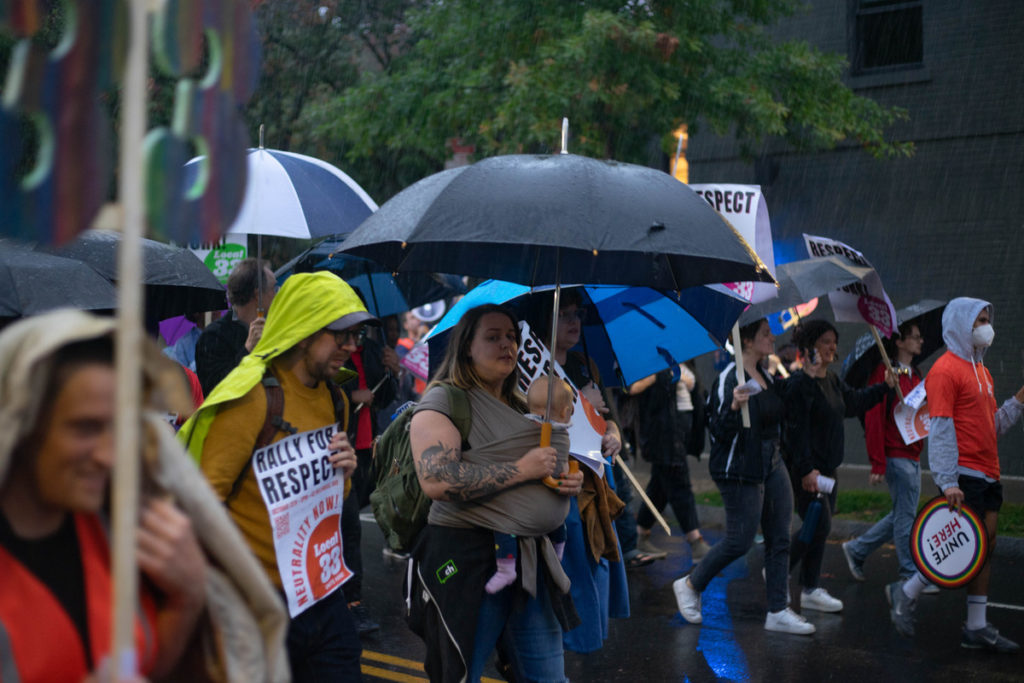
According to an Aug. 30 email sent by Tong to Yale’s graduate students, over 500,000 graduate workers, faculty and postdoctoral students are unionized throughout the nation. In the past six years, they have secured contracts at peer institutions like Harvard, Brown, MIT and Columbia. Tong declared that such unions “deepen democracy,” encouraging Yale’s graduate workers to continue organizing despite University pushback.
“Sometimes employers and managers take aggressive steps to undermine organizing or make people afraid to exercise their rights to unionize,” Tong wrote. “In my capacity as Attorney General, I urge the leaders of Yale University to commit to respecting your rights to organize and unionize without interference or employer opposition.”
In 2021, the National Labor Relations Board ruled that graduate students at private universities have the right to unionize.
